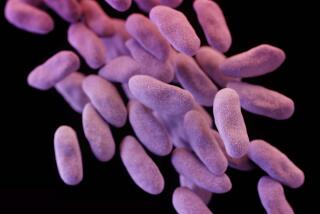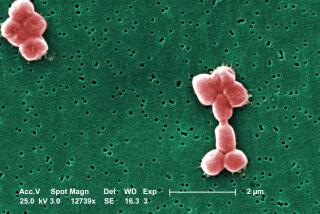Experimental Drug Targets Colon Cancer
Studies in animals have shown that a newly developed drug can cure colon cancer, a disease for which there is no effective chemotherapy.
The research team, led by Dr. Beppino C. Giovanella of the Stehlin Foundation for Cancer Research in Houston, predicted that human tests of the drug could begin in as little as a year.
Colon cancer strikes one in 25 Americans, an estimated 107,000 per year, according to the American Cancer Society, and 53,500 victims die each year. Colon cancer is third in incidence, behind lung and breast tumors, and in number of deaths it is second only to lung cancer.
The most effective treatment is surgery and radiation; if colon cancer is caught in an early, localized stage, the five-year survival rate is 87%. But if the cancer spreads before it is detected, the survival rate plunges to 40%.
The new drug, called 9-AC, is a derivative of camptothecin, first isolated from a Chinese ornamental tree called Camptotheca acuminata. In the early 1970s, camptothecin was tested in humans with an advanced form of gastrointestinal cancer.
The drug produced partial remissions in some patients, but the trials were halted because of the drug’s life-threatening side effects, especially leukopenia, a sharp decrease in the number of disease-fighting white cells.
Researchers remained interested in camptothecin, however, because of its unusual mechanism of action. It inhibits an enzyme known as topoisomerase I, which is crucial to the replication of DNA (deoxyribonucleic acid, the genetic blueprint of life) during the multiplication of cells.
In the normal human cell, extremely long strands of DNA are coiled up tightly inside structures called chromosomes. Before the DNA can be copied for reproduction, it must be uncoiled so that the new DNA is not irretrievably tangled with the old. Topoisomerase I uncoils it.
Cancer researchers are excited about the discovery of topoisomerase I because it offers a new point at which the reproductive cycle of cancer cells can be attacked. And because it is the only enzyme that uncoils DNA, researchers believe that cells will be unable to circumvent the blocked enzyme and thereby develop resistance to the drug. Studies have also shown that colon tumor cells have above-normal concentrations of topoisomerase I.
Giovanella and his colleagues administered 9-AC, which was synthesized by chemist Monroe E. Wall of the Research Triangle Institute in North Carolina, to 50 immunodeficient mice in which human colon tumors had been implanted. The group reported last week in the journal Science that, after treatment, all but one of the mice showed a complete remission from the tumors. Furthermore, the drug produced no adverse side effects.
In contrast, 50 other mice that received the tumors but no drug all died.
“In 20 years of experimenting with human colon cancers at this laboratory, we have never seen this type of dramatic response,” said Dr. John Stehlin, scientific director of the Stehlin Foundation. Experts cautioned, however, that many anti-cancer drugs found promising in animals were not as effective in humans.






